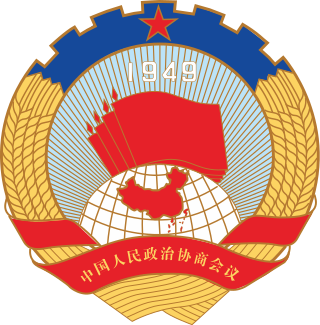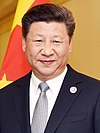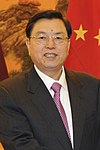
The State Council of the People's Republic of China, also known as the Central People's Government, is the chief administrative authority and the national cabinet of China. It is constitutionally the highest administrative organ of the country and the executive organ of the National People's Congress, the highest organ of state power. It is composed of the premier, vice premiers, state councilors, ministers, chairpersons of commissions, the auditor-general, the governor of the People's Bank of China, and the secretary-general.

The premier of China, officially the Premier of the State Council of the People's Republic of China, is the head of government of the People's Republic of China (PRC) and leader of the State Council. This post was established in 1911 near the end of the Qing dynasty, but the current post dates to 1954, five years after the establishment of the PRC. The premier is the third-highest ranking official in China's political system after the general secretary of the Chinese Communist Party and the president, and holds the highest rank in the civil service of the central government.

The Chinese People's Political Consultative Conference (CPPCC) is a political advisory body in the People's Republic of China and a central part of the Chinese Communist Party (CCP)'s united front system. Its members advise and put proposals for political and social issues to government bodies. However, the CPPCC is a body without real legislative power. While consultation does take place, it is supervised and directed by the CCP.

The Standing Committee of the National People's Congress (NPCSC) is the permanent body of the National People's Congress (NPC), the national legislature of the People's Republic of China. It exercises the powers of the NPC when it is not in session.

The Central Committee of the Chinese Communist Party, officially the Central Committee of the Communist Party of China, is the highest organ when the national congress is not in session and is tasked with carrying out congress resolutions, directing all party work, and representing the Chinese Communist Party (CCP) externally. It is currently composed of 205 full members and 171 alternate members. Members are nominally elected once every five years by the National Congress of the Chinese Communist Party. In practice, the selection process is done privately, usually through consultation of the CCP's Politburo and its corresponding Standing Committee.

The 10th National People's Congress (NPC) was in session from 2003 to 2008. It held five plenary sessions in this period. There were 2,984 deputies to this Congress. It succeeded the 9th National People's Congress.

The 9th National People's Congress (NPC) was in session from 1998 to 2003 across five plenary sessions. It followed the final session of the 8th National People's Congress. There were 2,979 deputies to this Congress.

The 6th National People's Congress (NPC) was in session from 1983 to 1988. It held five sessions in this period.

The 5th National People's Congress (NPC) was in session from 1978 to 1983. It succeeded the 4th National People's Congress. It held five plenary sessions in this period.

The 11th National People's Congress (NPC) met for a 5-year term, from 2008 to 2013. It held five annual two week plenary sessions during this period. It succeeded the 10th National People's Congress. There were 2,987 deputies elected to the 11th Congress in 2008,
The Five-Year Plans are a series of social and economic development initiatives issued by the Chinese Communist Party (CCP) since 1953 in the People's Republic of China. Since 1949, the CCP has shaped the Chinese economy through the plenums of its Central Committee and national party congresses. The plenums follow a customary pattern of themes; since the 14th Party Congress (1992–1997), the fifth plenum has evaluated the current five-year plan and outlined the next five-year plan.
The 4th Session of the 11th National People's Congress held its annual meeting in March 2011 at the Great Hall of the People in Beijing, China. The event opened on 5 March and concluded on 14 March. The meeting was expected to approve the country's 12th Five Year Plan.

The 12th National People's Congress (NPC) was elected in national congressional conferences from October 2012 to February 2013 and was in session from 2013 to 2018. It succeeded the 11th National People's Congress. It held five plenary sessions in this period, occurring around early March every year. It was succeeded by the communing of the 13th National People's Congress.

The National People's Congress (NPC) is the highest organ of state power of the People's Republic of China (PRC). The NPC is the only branch of government in China, and per the principle of unified power, all state organs from the State Council to the Supreme People's Court (SPC) are subservient to it. With 2,977 members in 2023, it is the largest legislative body in the world. The NPC is elected for a term of five years. It holds annual sessions every spring, usually lasting from 10 to 14 days, in the Great Hall of the People on the west side of Tiananmen Square in Beijing.
The 2014 National People's Congress held its annual meeting in March 2014 at the Great Hall of the People in Beijing, China. The session opened on 5 March and concluded on 13 March.
The 2019 National People's Congress, or the Second Session of the 13th National People's Congress, was held in March 2019 at the Great Hall of the People in Beijing, China. The session opened on 8 March and concluded on 20 March. Major state positions were elected in this session.
The 2020 National People's Congress was the Third Plenary Session of the 13th National People's Congress. It was held from Friday 22 to 28 May, concurrently with the Chinese People's Political Consultative Conference (CPPCC) as part of the annual Two Sessions. It was originally scheduled to be held in March 2020 at the Great Hall of the People in Beijing, China, however due to the global COVID-19 pandemic, it had been delayed until May.
The 2021 National People's Congress (NPC) was the Fourth Plenary Session of the 13th National People's Congress of the People's Republic of China (PRC). It was held from 5 March to 11 March 2021, concurrently with the Chinese People's Political Consultative Conference (CPPCC) as part of the annual Two Sessions. The NPC was held at the Great Hall of the People in Beijing.
The 2023 National People's Congress, officially the First Session of the 14th National People's Congress, was held in March 2023 at the Great Hall of the People in Beijing, China. The session opened on 5 March and concluded on 13 March. Major state positions of China were elected in this session.
The 2024 National People's Congress (NPC) was the Second Plenary Session of the 14th National People's Congress of the People's Republic of China (PRC). It was held from 5 March to 11 March 2024, concurrently with the Chinese People's Political Consultative Conference (CPPCC) as part of the annual Two Sessions. The NPC was held at the Great Hall of the People in Beijing.






